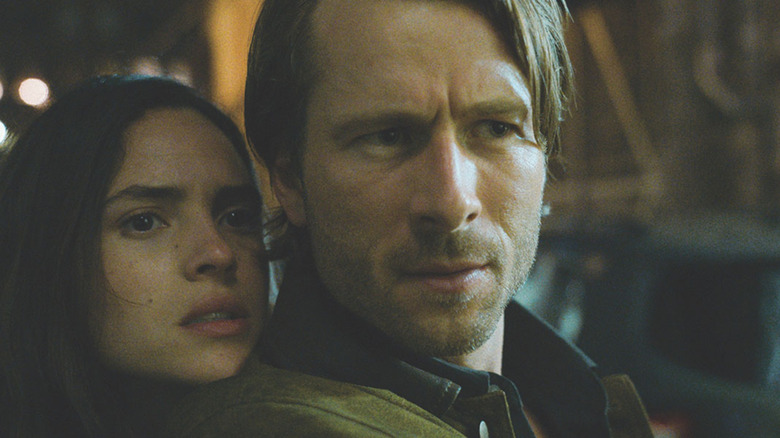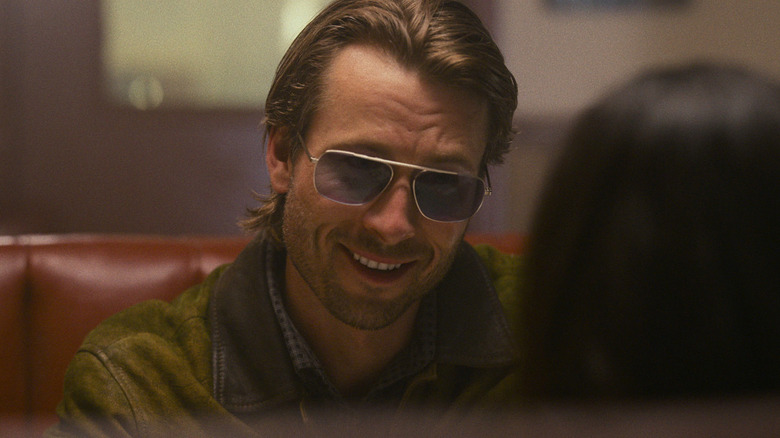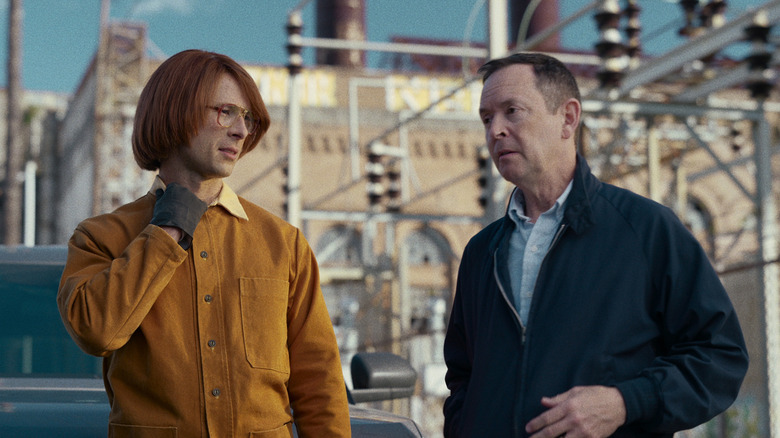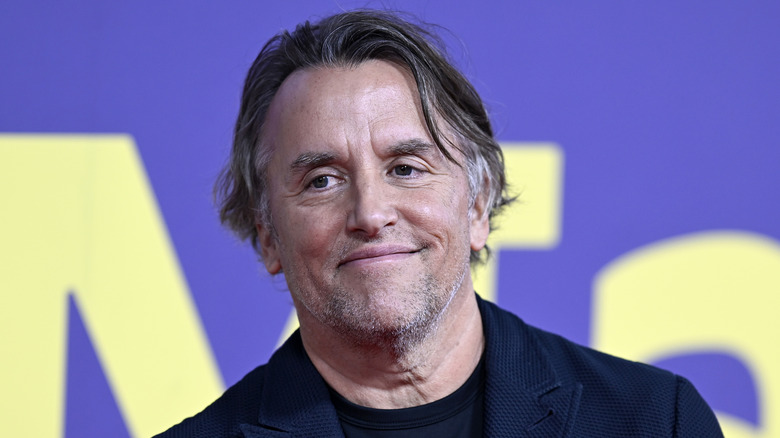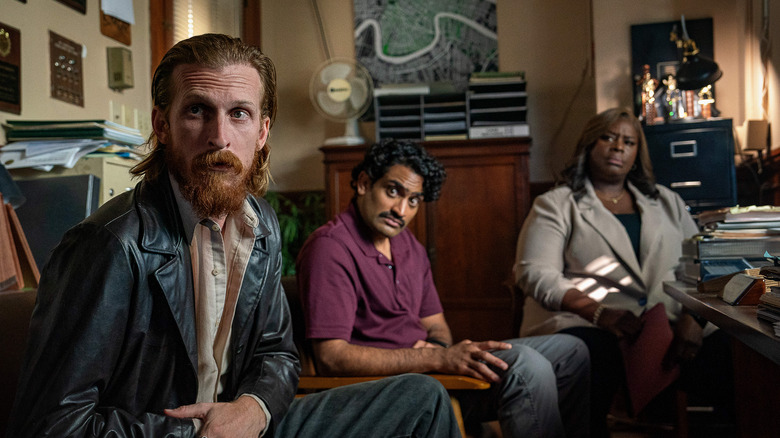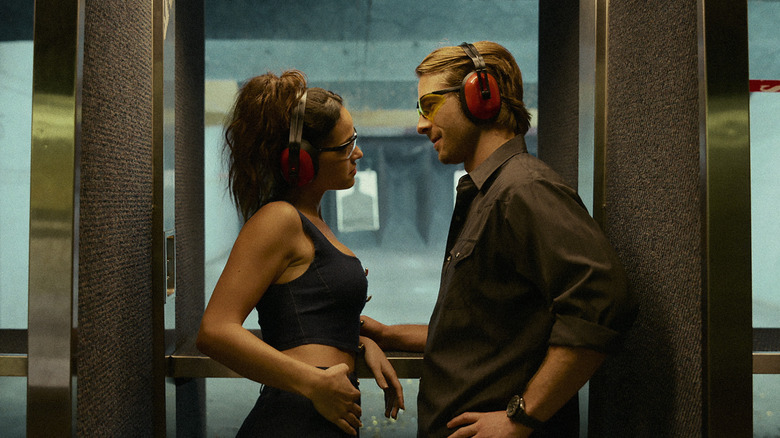The Ending Of Hit Man Explained
When word got out that Richard Linklater and Glen Powell were planning on collaborating on a film about a pretend hitman who disappears into his role, ears perked up all over the world. When it came out of the fall festival season with almost nothing but rave reviews, it was all but confirmed: "Hit Man" was going to be a hit, man.
With Linklater behind the camera, Powell in front, and the two sharing writing responsibilities, "Hit Man" is a sunny take on a movie from decades gone by — somewhere between noir, screwball comedy, and the unique brand of studio film from 50 years ago that might have seen Paul Newman or Robert Redford in the lead role. Powell, who has been knocking on leading man status for ages now, launches a one-man charm offensive that wins over audiences with his powerful screen presence and scorching chemistry with his co-star Adria Arjona.
Although "Hit Man" came out of the Venice and Toronto film festivals without distribution, it was quickly picked up by Netflix — a decision that was met with some disappointment from fans who felt that the film would perform better in front of a theater audience. Still, the streaming service will put "Hit Man" in front of plenty of eyes who might not otherwise see it at the cinema. With numerous twists and turns along the way, audiences might need a little bit of a recap at the end of "Hit Man." Here's everything you need to know about how Glen Powell's ersatz assassin winds up by the time the credits roll.
What you need to remember about the plot of Hit Man
Gary Johnson (Glen Powell) is a college philosophy professor in New Orleans whose personal life is about as interesting as a slice of unbuttered toast. Probably the most exciting thing about him is the fact that he moonlights for the New Orleans Police Department, but even that is an extremely technical, behind-the-scenes IT job. That is, until his loose cannon of a coworker Jasper (Austin Amelio) gets suspended, and Gary has to step into his role as fake hit man. His job is to meet with people looking to take out a contract on someone, and gently guide them into incriminating themselves. And you know what? He's surprisingly good at this new job. Gary throws himself into the performance aspect of it, creating an endless array of false personas to make his targets buy into him as a hitman.
But the problem comes when he meets Madison (Adria Arjona), a wife who wants to take a hit out on her abusive husband. Sparks fly between them — or at least, between Madison and Ron, Gary's ultra-cool hitman persona. Against the instructions from his team, he stops her before she says anything that could land her in trouble. And although he knows it's probably a bad idea, he can't help but stay in contact with her. The two begin a passionate affair, and the lines between Ron and Gary become even more blurred as he struggles both with maintaining his ruse and preventing his coworkers from discovering what he's doing.
What happened at the end of Hit Man?
Things really start to spiral out of control towards the end of the film, when Madison falls under (completely accurate) suspicion of murdering her estranged husband. Desperate to protect her, Gary manages to coach her through a conversation that convinces the police of her innocence, and it seems for one brief shining moment that they're in the clear. That is, until Jasper turns up at Madison's house, clearly not fooled by their deception and smelling blood in the water. He offers them a deal: He won't tell the police department what he knows about their relationship or Madison's involvement in her husband's death in exchange for a healthy portion of the life insurance money Madison is due to collect. It seems that their luck has finally run out and Jasper has the upper hand. But he doesn't realize that in playing the consummate host and offering Jasper a beer, Madison has actually drugged him, leaving the shady policeman passed out on the floor.
At this moment, Gary quickly discovers an elegant solution to their problem. Jasper is a thorn in the police department's side, he has a history of instability and drug use, and no one will be too broken-hearted if he simply disappears. Therefore, Gary is fairly certain they can kill Jasper without any suspicion falling back on them. They suffocate him with a bag over his head, then make plans to have him discovered in his car in some remote spot where he would look like he overdosed to any potential investigators.
"Hit Man" then jumps forward a number of years, showing Gary and Madison happily married with two children. They seem to have left their life of crime behind, and Gary reveals that over time, he found a natural balance between the personas of Gary and Ron. The film closes with their child asking them how they first met — a question neither finds easy to answer.
What happens to Gary and Madison?
Crime doesn't pay — except sometimes when it does. By the end of "Hit Man," Gary and Madison have gotten away with two murders — ironically, the same thing that Gary spent the majority of his professional career with the New Orleans Police Department sending people to jail for. But in the epilogue, which takes place several years in the future, they seem to have been able to put this all behind them. After all, neither of their victims — an abusive husband and a violent, corrupt police officer — were the most sympathetic individuals, and certainly not the type of people anyone would spend a tremendous amount of time investigating after their deaths.
Gary is still teaching, although there is no mention of his part-time police work, so it's likely he has since given this up. Madison is an active member of the PTA at her children's school, and in the brief moments we are privy to, they seem like loving and involved parents. The unconventional beginning of their relationship appears to have been relegated to the status of a meet-cute that they won't be discussing with anyone else anytime soon.
Anyone can reinvent themselves
One of the central tenets of "Hit Man" is the concept of reinvention. Gary and his ex-wife have a conversation early on in the film about how it's possible for someone to purposefully shift their personality by taking on the qualities they would like to possess, until eventually they're no longer pretending to have them. That's the focus of her research as a psychologist, in fact, which sets up the theme of the film nicely. Gary's many disguises — which are admittedly played for humor most of the time — underscore this point. Gary is a virtual chameleon, taking on a number of different personas, morphing himself into whatever his marks need him to be.
But this idea really comes to a head the more time that Gary spends as Ron. Slowly, the smooth, charismatic personality that defines his would-be hit man begins to seep into his everyday life. He is able to connect more with his students (especially the female ones, who start to wonder exactly when their professor got hot) and is more assertive when he's called to testify against the people who tried to hire him to commit murder. By the end, we've seen Gary turn into a whole new man — first as one who is capable of cooly committing murder, and then eventually as a hybrid of Gary and Ron in his married life. Essentially, "Hit Man" advocates for the "fake it until you make it" personal philosophy.
Or maybe they stay the same
As we are told in the flashforward, Gary is essentially Ron and Ron is essentially Gary. He's found a way to take the best qualities of both personas and fuse them together to lead a happy and fulfilling life with his wife and children. But it's difficult not to wonder: Is Gary still acting? We know from earlier in the film that he's incredibly adept at climbing into the skin of all these different characters. On some level, when he incorporates aspects of Ron to please Madison or to feel better about himself, can we argue that Gary's still playing a part?
When he says that he's found a balance between Gary and Ron, there's a sense that he's merely figured out a way to tap into the more assertive and charming side of himself that was always lingering beneath the surface. But there's a reading of "Hit Man" where this isn't necessarily the case. Instead, it's entirely possible that Gary is doing what he's always done, which is creating a clever and detailed facade to become what other people want him to be. Furthermore, there's still the question of how much Madison fell in love with Ron, and if she would feel the same way about him without these elements of performance that Gary is carrying out.
The malleability of identity in modern society
"Hit Man" is inspired by a true story — an article in Texas Monthly about Gary Johnson caught the eye of Richard Linklater and Glen Powell, and they used it as a jumping-off point for their film, even as it takes some liberties with the relationship between Gary and Madison, who were not together in real life. But Linklater also intended the story of Gary Johnson to speak to modern concepts of truth and identity. In a cultural landscape where social media allows people to curate their own public identity — to be seen how they want to be seen rather than as they truly are — our sense of self is shakier than ever.
"This was about the notion of self-identity," Linklater explained in an interview with Deadline. "Gary becomes trapped by his own choices in a way. He's trapped in an identity that he prefers. Doesn't that feel like it's something that's in the air right now, that identity — the way we identify — is very unstable?" He went on to further detail how this ties into modern society, adding, "It can be whatever you want it to be. Truth can be whatever. I don't know if it's the virtual-ness of our era, but we're definitely in something new."
What has the director of Hit Man said about the ending?
As "Hit Man" premiered at fall festivals, director Richard Linklater has spoken extensively about how the film unfolds, specifically regarding the development of Gary's character arc. The fact that Gary is a college philosophy professor has a major connection to the themes of "Hit Man," as Linklater sees them, as his perception of identity is influenced by philosophical musings of the self. "What is truth? Is it fixed?" he asked rhetorically in an interview with The Hollywood Reporter.
Linklater went on to elaborate, saying, "Here, we chose to take it in a direction that I think is more positive, with regard to identity. The idea that you're not fixed. We've all known people who just inevitably get worse and become a total s#$%bag. But there's also the notion that you can actually become a better, changed version of yourself — the whole 'as if' principle — and not just be bulls#$%^ing." The fact that the film ends with Gary having gotten the girl and figuring out how to take on the qualities he always wished he had while still being true to his own personal identity is a reflection of Linklater's belief in the possibility of this sort of change.
But the flexibility of these characters — in particular, their understanding of their own morality and the lengths they're willing to go to in certain circumstances — is something on Linklater's mind as well. "This century, truth is upended, and everything's inverted. Moral, immoral. What is that? I want people thinking about that," he told NME.
What have critics said about the film's ending
"Hit Man" has been received with almost universal praise from critics, taking the fall festival season by storm as one of its biggest — and most pleasant — surprises. Ben Croll of The Wrap discussed the reception it earned at Venice, remembering "howls of laughter, who offered impromptu mid-film applause and adulation at several points, and who stumbled out of the film's world premiere nearly drunk on joy." In its climatic Notes app sequence, "Hit Man" generated a strong — and incredibly vocal — audience response.
Others praised how well the film manages to handle both its light comedy moments and its darker noir elements, with Hannah Strong of Little White Lies writing, "It's easy to get swept up in the humour of it all and overlook the rather dark third act, but this balance is integral to the film's success. What Gary wants us to believe is a love story actually looks closer to a tale of blossoming sociopathy." Its success with film festival audiences was such that the news of Netflix distributing "Hit Man" was met with frustration, since, like most comedies, it performs best with a large in-person crowd who will audibly react to the film, rather than being something you put on in the background while you're folding laundry.
Will there be a sequel?
"Hit Man" exists as a self-contained story, and as the main characters end the film largely settled into a quiet, domestic life, it's hard to imagine them returning to a life of crime for a sequel. That said, Richard Linklater is certainly no stranger to expanding upon his previous works when the occasion calls for it — look no further than the delightful "Before" trilogy, with two sequels to a film that when it was originally released seemed like a total standalone.
Richard Linklater and Glen Powell clearly enjoy working together, with Powell previously starring in Linklater's "Everybody Wants Some!!" and the two taking on an even more collaborative relationship with this film, sharing co-writing duties. It seems unlikely that they would end up expanding the "Hit Man" universe, since they wrapped everything up so neatly here, but we suppose it's always possible that they might revisit the characters that have clearly enthralled audiences. What's much more likely is that Linklater and Powell will continue to work with each other in the future, establishing the sort of professional relationship that the director has with Ethan Hawke.


